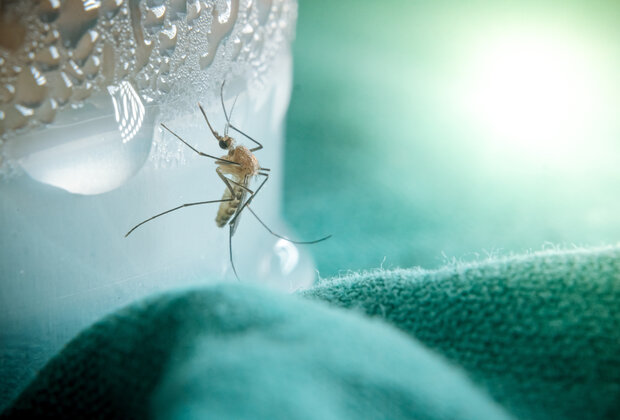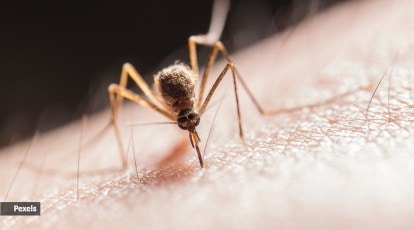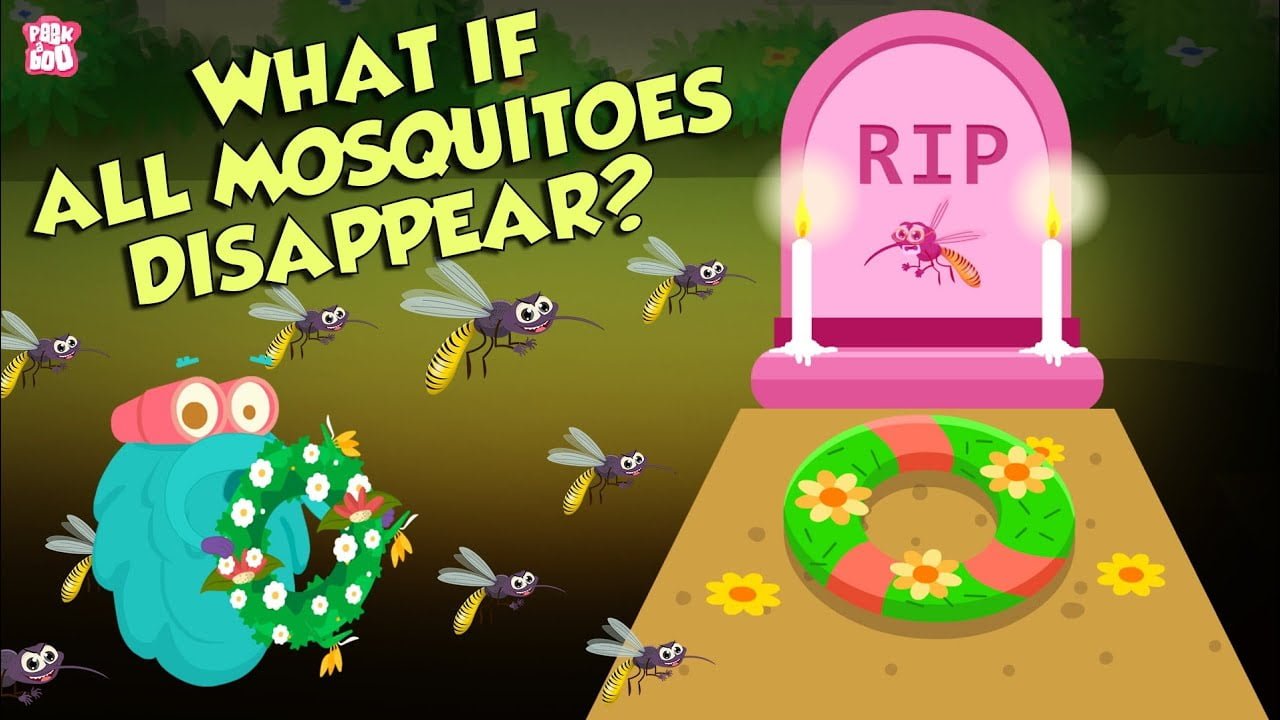If mosquitoes disappeared, it would disrupt the ecosystem, affecting animals that rely on them for food. Many species, including fish and birds, would need to adapt their diet to survive, leading to potential population declines.
Additionally, mosquitoes play a role in pollination and are a food source for various animals, so their absence could have far-reaching consequences. This disruption could have a cascading effect on the entire food chain and ecosystem, highlighting the interconnectedness of species in nature.
The elimination of mosquitoes could lead to significant changes in biodiversity and potentially impact the balance of various ecosystems worldwide.

Credit: www.nicd.ac.za
The Role Of Mosquitoes In Nature
Mosquitoes play a crucial role in various ecosystems, serving as a vital part of the food chain and contributing to the balance of nature.
Diet Of Predatory Species
Mosquito larvae are a crucial food source for many aquatic species, including fish, frogs, and other insects.
Pollination And Biodiversity
Some mosquito species also play a role in pollination, aiding in the reproduction of plants and maintaining biodiversity.
Immediate Effects Of Mosquito Extinction
Mosquitoes are known for their irritating bites and ability to transmit diseases, but have you ever wondered what would happen if they were to suddenly disappear from the face of the Earth? The immediate effects of mosquito extinction would have a significant impact on various aspects of our ecosystem. Let’s explore the short-term ecological consequences and the adaptation of mosquito predators.
Short-term Ecological Impact
The absence of mosquitoes would cause a ripple effect throughout the ecosystem. While some may rejoice at the thought of no more itchy bites, the truth is that mosquitoes play a vital role in the balance of nature.
Here are some immediate ecological impacts that could occur:
- Decreased pollination: Mosquitoes are known to feed on nectar and inadvertently assist in pollination. The absence of these tiny pollinators could disrupt the reproductive cycle of certain plant species.
- Disruption of food chains: Mosquitoes serve as a significant food source for various organisms, such as birds, bats, fish, and other insects. Their disappearance would create a vacuum in the food chain, affecting the predators that rely on mosquitoes as their primary food source.
- Reduction in biodiversity: The removal of mosquitoes could potentially lead to a decline in the overall biodiversity of an area. Many species have evolved to coexist with mosquitoes, and their absence could disrupt the delicate balance of the ecosystem.
Adaptation Of Mosquito Predators
With the sudden absence of mosquitoes, their predators would need to adapt to the new circumstances. While some predators may be able to switch to alternative food sources, others may struggle to find suitable replacements.
Here are some potential adaptations that mosquito predators might undergo:
- Shift in diet: Predatory insects and birds that rely heavily on mosquitoes may need to adjust their diet to target other insects or small aquatic organisms.
- Competition for resources: The removal of mosquitoes could lead to increased competition among predators for alternative food sources. This competition may cause some predators to thrive while others struggle to find enough sustenance.
- Potential population decline: If predators are unable to adapt or find suitable alternative food sources, their populations may decline, leading to further disruptions in the ecosystem.
While the immediate effects of mosquito extinction may seem beneficial to humans, it’s important to consider the broader ecological implications. The delicate balance of nature depends on the interplay between various species, and the sudden removal of one can have far-reaching consequences.
Long-term Ecological Consequences
The disappearance of mosquitoes could have significant long-term ecological consequences. Many fish species that rely on mosquito larvae as a food source would need to adapt their diet, potentially causing a decline in their populations. Additionally, birds and other animals that feed on adult mosquitoes could also be impacted, leading to potential disruptions in various ecosystems.
The disappearance of mosquitoes would have significant long-term ecological consequences, impacting various aspects of the ecosystem. Changes in food webs, the impact on plant life, and the overall balance of the environment would be among the key effects.
Changes In Food Webs
One of the most significant consequences of mosquito disappearance would be the disruption of food webs. Mosquitoes serve as a crucial food source for many animals, including birds, fish, and bats. Without mosquitoes, these species would need to adapt their diets, leading to a potential decline in their populations.
For example, the mosquitofish, a specialized predator known for its ability to control mosquito larvae, would face challenges in finding alternative food sources. This could impact the population dynamics of the fish and potentially disrupt the balance of the aquatic ecosystem.
Impact On Plant Life
Mosquitoes also play a role in pollination, although their contribution is relatively minor compared to other pollinators like bees and butterflies. Nonetheless, their absence could still have some effects on plant life.
Some mosquito species contribute to the pollination of certain plant species, particularly those that rely on mosquitoes for cross-pollination. The loss of these mosquito pollinators could potentially affect the reproduction and genetic diversity of these plants, leading to changes in their populations over time.
However, it is important to note that the overall impact on plant life would likely be minimal, as other pollinators would still fulfill the role of mosquito pollination to a larger extent.
Additionally, the removal of mosquitoes may also lead to an increase in the population of other insect species that compete with mosquitoes for nectar resources. This competition could have indirect effects on plant pollination and the distribution of resources among different insect species.
In summary, the long-term ecological consequences of mosquito disappearance would involve changes in food webs and potential effects on plant life. These effects would require various species to adapt their diets and behaviors, potentially leading to shifts in population dynamics and the overall balance of the ecosystem.
Impact On Animal Populations
The disappearance of mosquitoes could disrupt animal populations, leading to significant changes in ecosystems. Fish species, such as the mosquitofish, may struggle to find alternative food sources, impacting their survival. Bird populations could also decline, causing a ripple effect on the food chain.
Birds And Bats
If mosquitoes disappeared, it would have a significant impact on the populations of birds and bats. Many bird species rely on mosquitoes as a food source, especially during the breeding season. For example, purple martins, swallows, and other insectivorous birds consume large quantities of mosquitoes. Similarly, bats, known for their mosquito-eating prowess, would face a drastic decline in their food supply. This could lead to a decline in the populations of these animals, disrupting the delicate balance of ecosystems.Aquatic Ecosystems
The absence of mosquitoes would also affect aquatic ecosystems. Many fish species, such as the mosquitofish, feed on mosquito larvae. Without this food source, these fish would need to adapt their diet, which could lead to population declines and potential changes in the food web of aquatic environments. Additionally, other aquatic organisms, such as amphibians and reptiles, may also be impacted by the disruption in the mosquito-based food chain.In conclusion, the disappearance of mosquitoes would have a ripple effect on animal populations, especially birds, bats, and aquatic species, potentially leading to imbalances in various ecosystems.Human Health And Disease
Mosquitoes play a significant role in the transmission of various diseases that affect humans. If mosquitoes were to disappear, it would have a profound impact on human health and disease control.
Reduction In Disease Transmission
Without mosquitoes, diseases such as malaria, dengue fever, Zika virus, and yellow fever would see a significant reduction in transmission rates. These diseases are primarily spread by mosquitoes, and their disappearance would lead to a decrease in infection cases.
Alternative Disease Vectors
In the absence of mosquitoes, other insects like ticks and fleas may become more prominent as disease vectors. This shift could potentially lead to an increase in diseases transmitted by these alternative vectors, posing new challenges for disease control and prevention.

Credit: indianexpress.com
Genetic And Biological Control Efforts
If mosquitoes were to disappear, it would disrupt the ecological balance as they serve as a food source for many animals and play a vital role in pollination. Additionally, the absence of mosquitoes could lead to a decline in certain fish populations, impacting the food chain.
Strategies To Eliminate Mosquitoes
Several genetic and biological control efforts have been proposed and implemented to eliminate mosquitoes. These strategies aim to disrupt the breeding and reproduction cycles of mosquitoes, ultimately reducing their population and impact on ecosystems.
- Gene Drive Technology: This approach involves modifying the genetic makeup of mosquitoes to reduce their ability to transmit diseases or render them sterile, thereby limiting their population growth.
- Biopesticides: Utilizing naturally occurring microorganisms or biochemicals to target mosquito larvae without harming other organisms in the environment.
- Wolbachia Bacteria: Introducing Wolbachia bacteria into mosquito populations to interfere with their ability to transmit diseases, effectively reducing their threat to human and animal health.
- Use of Sterile Insects: Releasing sterilized male mosquitoes into the wild to mate with females, leading to non-viable offspring and a decline in the overall population.
Risks And Ethical Considerations
While these control efforts show promise in mitigating the impact of mosquitoes, there are associated risks and ethical considerations that need to be carefully evaluated.
- Unintended Consequences: Modifying the genetic makeup of mosquitoes or introducing new organisms into ecosystems may have unforeseen and potentially detrimental effects on other species and ecological processes.
- Ethical Implications: Manipulating the genetic traits of organisms raises ethical concerns regarding the intentional alteration of natural populations and the potential disruption of ecological balance.
- Resistance Development: Mosquitoes have shown the ability to develop resistance to control measures, posing a challenge in sustaining the effectiveness of genetic and biological interventions over time.
Arguments Against Mosquito Eradication
If mosquitoes were eradicated, it could have a significant impact on the ecosystem. Many fish species, such as the mosquitofish, rely on mosquito larvae as a food source. The absence of mosquitoes could disrupt the food chain, leading to changes in the diets of various animals and potentially affecting the overall balance of the ecosystem.
Ecological Importance
Although mosquitoes are known to cause several diseases, they also play an important ecological role in many ecosystems. For instance, mosquitoes serve as a food source for many animals, including birds, fish, bats, and other insects. Eliminating mosquitoes could have a significant impact on the food chain, causing a ripple effect on the entire ecosystem.Unpredictable Outcomes
Another argument against mosquito eradication is the unpredictable outcomes that could result from such a drastic measure. Scientists predict that eliminating mosquitoes could lead to the extinction of several other species, including those that rely on mosquitoes for survival. Furthermore, the sudden disappearance of mosquitoes could leave a void in the ecosystem that could be filled by other, possibly more harmful, species.While mosquitoes are undoubtedly a nuisance and a health hazard, their ecological importance cannot be ignored. Eradicating mosquitoes could have unpredictable and potentially harmful outcomes, making it a difficult decision to make. Therefore, it is important to continue researching and developing effective strategies to control mosquito populations while minimizing the impact on the environment.
Credit: www.usatoday.com
Rethinking Mosquito Management
Imagine a world without mosquitoes. If these pests were to disappear, it could have significant ecological consequences. Fish species, such as the mosquitofish, would need to change their diet, potentially causing a disruption in the food chain. Additionally, mosquitoes play a role in pollination and serve as a food source for birds, bats, and frogs.
Rethinking mosquito management requires considering the broader impact on the environment.
Conservation Approaches
With the potential disappearance of mosquitoes, there is no doubt that the ecological balance would be severely impacted. As such, conservation approaches may be necessary to prevent the extinction of important species that rely on mosquitoes for food. For instance, some fish species feed solely on mosquito larvae, and without mosquitoes, they would have to find an alternative food source. Conservation approaches that prioritize the preservation of such species would be vital in ensuring the continued survival of ecosystems.Future Research Directions
The potential extinction of mosquitoes is a complex issue that requires further research to fully understand its implications. Future research should focus on the development of alternative strategies for mosquito management that do not involve their total eradication. For instance, researchers could develop methods for controlling mosquito populations without causing widespread ecological damage. Additionally, research into the ecological roles played by mosquitoes and the potential impact of their disappearance would be critical in mitigating the negative effects of their loss.Rethinking Mosquito Management is essential to prevent the potential ecological disaster that could result from the disappearance of mosquitoes. Conservation Approaches and Future Research Directions are crucial in ensuring that ecosystems can continue to function without these disease-carrying insects. It is imperative that we carefully consider the potential consequences of any actions taken to manage mosquito populations and prioritize the preservation of the ecological balance.Frequently Asked Questions
Can The World Survive Without Mosquitoes?
The world can survive without mosquitoes, but some animals like fish and birds may be affected.
What Will Happen If There Are No Mosquitoes?
If mosquitoes were to disappear, it could have a significant impact on the ecological balance. Many fish species would need to change their diet, and some birds could see a decline in their populations. However, certain mosquito species also play important roles in the ecosystem, and more research is needed to fully understand the effects of their disappearance.
Why Can’t We Eliminate Mosquitoes?
Eliminating mosquitoes is challenging due to their rapid mutation, adaptation, and unknown biology. They play a vital role in the food chain as a food source for various animals, including fish, birds, and bats. Their absence could disrupt ecosystems and endanger other species.
Conclusion
In the event of mosquitoes disappearing, the ecological balance would be significantly impacted. Many animals, including fish and birds, would need to adapt to a new diet. While it might seem like a positive change for humans, the repercussions for the ecosystem would be profound.
It’s clear that mosquitoes, despite their nuisance, play a crucial role in the natural world.
Related posts:

I’m MD Tanvir, and I bring years of expertise gained from working closely with pest control companies to the forefront. My journey in the industry has inspired me to launch Bug Battler, a platform aimed at equipping people with the know-how to combat pests autonomously. Through Bug Battler, I aim to empower individuals with practical insights to tackle pest infestations effectively.

